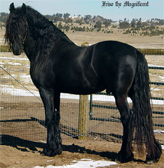Does My Horse Have Horse Diabetes?
No. Horses do not get Diabetes like people.
Equine Insulin Resistance is mistakenly called Horse Diabetes, Horse Pre-Diabetes, Horse Early Stage Diabetes, or Horse Type 2 Diabetes – for years and it created confusion. Horses and people can both get Insulin Resistance, but horses do not go to the next step of Diabetes. In people, they can advance on to Diabetes if Insulin Resistance is not controlled.
![]() Click here for information from the American Diabetes Association on Blood Glucose –Horses do not get Type 2 Diabetes
Click here for information from the American Diabetes Association on Blood Glucose –Horses do not get Type 2 Diabetes
In Insulin Resistance: Blood Insulin is high but Blood Glucose (Blood Sugar) is normal for both horses and people. In people, Early Stage Type 2 Diabetes occurs if Insulin Resistance is not controlled: Blood Insulin is High, Blood Glucose is also high. Horses do not get this type of Diabetes. In people, if Early Stage Type 2 Diabetes is not controlled, the Pancreas cells “burn out” and can’t make Insulin any more, so Blood Sugar goes super high and Insulin shots are required. This is called Late Stage Diabetes. Again, horses do not get this type of Diabetes.
![]() Click here to read about Human Type 2 Diabetes from the National Institute of Health (NIH). See why this is not in horses.
Click here to read about Human Type 2 Diabetes from the National Institute of Health (NIH). See why this is not in horses.

|
|
Blood Insulin |
Blood Glucose |
| Horse and Human in Insulin Resistance |
High |
Normal |
| Human Early Stage Diabetes |
High |
High |
| Human Late Stage Diabetes |
Low |
Sky High |
Rarely in horses, Glucose values can be elevated such as in Equine Cushings, extreme infections, high fevers, and certain cancers. If the horse is already having Equine Insulin Resistance with high Insulin, then will see high Insulin and High Glucose. This is not true Horse Diabetes but an overlapping of diseases. Once the horse is treated, Glucose levels will drop back down to normal.
![]() Click here to see 26 ways HEIRO is the Best Choice and why the winner over other products.
Click here to see 26 ways HEIRO is the Best Choice and why the winner over other products.
Proper diet and exercise is essential for horse health. This product is a supplement to help maintain horse health. This product is not intended to diagnose, treat, cure, or prevent disease.
Dangers of Velagliflozin in Horses:
1. The study is being paid for by the drug maker Boehringer that wants to market it for horses – that is a major conflict. It is not an independent university study.
2. The study shows a major problem with this drug – at no time have they been able to get anywhere near to normal when tested. Normal on a challenge test is under 60 uiI/ml and after on this drug for 48 weeks only could get to an average of 149 – that is 148% above normal. So how can anyone say this is a good med? This means horses on it still have sky high insulin, still have laminae expected to sky high insulin. That equals failure.
3. Class of drug SGLT-2 is also used in people but with diabetes – but horses with IR don’t have high glucose, so why use a drug that affects glucose if glucose level of IR horses is already normal? Make no sense, now see why not working to get to normal on insulins. Any direct action on insulin with SGLT-2 med? None.
4. SGLT2 meds cause genital gangrene in human patients in some cases – why get this drug near your horse? Click Here: Dr. Dressler, FDA Warning
5. The SGLT2 human med empagliflozin (also made by Boehringer that makes velagliflozin) which is also SGLT-2.
-Increases bone fractures in some patients. Creates bone mineral density decreases = why use on your horse?-
-Acute Kidney InjuryUrinary tract infections – in horse study on velagliflozin, they did not do urine testing on cultures – they skipped it!
-Hypotension – SGLT-2 causes increased urine output due to sugar in urine which creates dehydration – why use on a horse?
-Increase yeast infections in humans.Click Here – Drugs.com
6. FDA warnings on SGLT2 meds.
-Genital area infections.
–Foot and leg amputations – wow! Not hearing about that!
-Kidney problems
-Bone fracture risk – not worth this happening
Click Here: FDA
7. Costs – on average $442 a year to treat people with a SGLT-2 med (Jardience) so 5-6x for a horse weight (1000 lbs) so $2210 – $$2652 a year in a horse? And not get near normal insulins? Still 148% above normal for $2000?





; ?>/wp-content/themes/twentyten/img/NMImacLogo_150.jpg)






